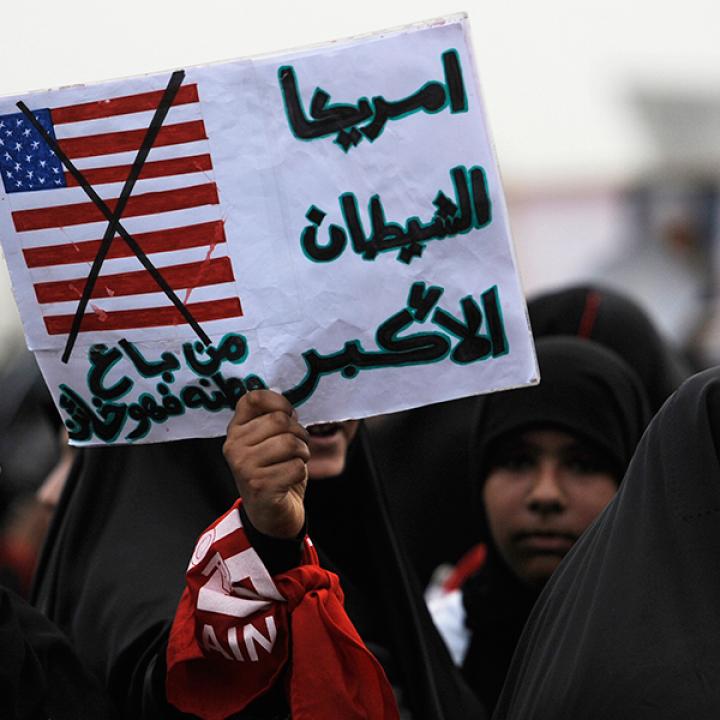

The latest crackdown by Bahraini security forces, which came two days after President Trump's friendly conversation with King Hamad, could raise tensions on the island and with Iran.
On May 21, on the sidelines of a multilateral summit in Saudi Arabia, President Trump told King Hamad bin Isa al-Khalifa of Bahrain, "Our countries have a wonderful relationship together...[T]here has been a little strain, but there won't be strain with this administration." The "wonderful relationship" probably reflects the king's longstanding willingness to host the headquarters of the U.S. Fifth Fleet. The "little strain" was likely a nod to the concerns of successive U.S. administrations about Bahrain's treatment of its majority Shiite citizens, who are underrepresented in the national assembly and economically marginalized by a Sunni royal family that views them as too sympathetic to Iran. In 2014, for example, a top State Department official was expelled from the island after meeting with a group of Shiite politicians whose party was subsequently banned.
The same day as Trump's remark, a Bahraini court announced a one-year suspended sentence against local Shiite spiritual leader Sheikh Isa Qassem, whose charitable collection efforts (or khums) have been described as money laundering by the government. Authorities revoked his citizenship last June on accusations that he promoted violence, and he has since remained in his village surrounded by supporters in an uneasy standoff.
On the morning of May 23, security forces moved into the area, whereupon clashes erupted and one protestor was reportedly killed. According to the government, the operation was intended to arrest fugitives; some were discovered hiding in Sheikh Isa's home, but he does not appear to have been detained. The Interior Ministry also claimed that "members of a terrorist cell" attacked police with firebombs and injured several officers, forcing them to "respond proportionately." In addition, the government noted that some of those arrested today were among the ten Shiite terrorist convicts who escaped in a January prison break. Two of these escapees were killed in February when their boat was intercepted en route to Iran. Others are believed to have reached Iran, but as many as four were considered still at large at the time of today's operation.
The latest spike in tensions is reportedly affecting Shiite villages across the north of the island. As many as 286 people were arrested today alone, and the Interior Ministry warned all drivers planning to use Budaiya highway "to seek alternative roads until the traffic is back to normal." Meanwhile, the government is still addressing a smaller problem with Sunni extremists, some of whom have served in its security forces and later joined the Islamic State in Iraq and Syria. In fact, the group's top religious advisor is a Bahraini citizen.
Washington has been concerned for some time about Iran's track record of supplying small arms and explosives to Bahraini Shiites, including equipment for making improvised explosive devices. Tehran's principal regional proxy, Hezbollah, often weighs in on the island's sectarian tensions as well; after today's violence, the group warned of "unpredictable consequences" if Sheikh Isa were harmed. For now, though, U.S. officials have judged that Bahrain is not a primary focus of regional meddling by Iran or its allies. They take a similar view of the situation in the neighboring oil-rich Eastern Province of Saudi Arabia, where clashes broke out last week between Shiite activists and security forces in the town of Awamiyah, close to the giant oil export terminal of Ras Tanura.
Currently, most Bahraini Sunnis and Shiites alike welcome the presence of the U.S. naval base because of its low profile and positive impact on the local economy. But the hardline royal elements who favor tougher action against Shiite protests may regard President Trump's comment in Riyadh as permission to escalate, and the discovery of the prison escapees as justification for doing so. Today's events could have dangerous consequences for both Bahrain and Saudi Arabia.
Simon Henderson is the Baker Fellow and director of the Gulf and Energy Policy Program at The Washington Institute, and coauthor of its 2017 Transition Paper "Rebuilding Alliances and Countering Threats in the Gulf."



